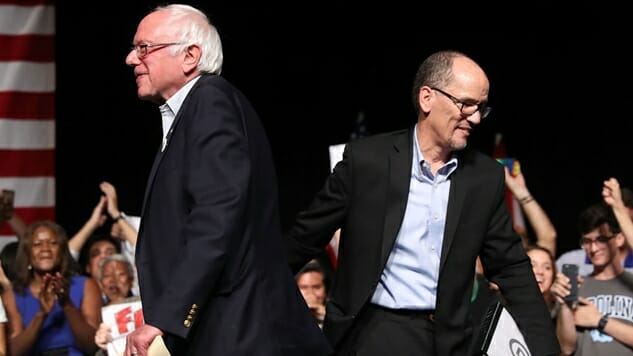Three Ways The Democrats Can Quit Squabbling and Unite to Win The Presidency in 2020
Photo by Joe Raedle/Getty
Donna Brazile sent shockwaves through the Democratic world after publishing an excerpt from her book in Politico, which alleged that the Democratic Party tried to rig the primary in favor of Hillary Clinton. Elizabeth Warren echoed that sentiment, telling CNN’s Jake Tapper “yes” when he asked if she believed that the DNC tried to rig the primary for the woman she supported over Bernie Sanders.
This led to predictable infighting—where the left used the episode to highlight the DNC perpetually being an incompetent waste of money—and Democratic partisans painted Brazile an opportunistic turncoat. This was exacerbated as more details of Brazile’s book came out, and Brazile claimed that she thought about replacing Hillary Clinton at the top of the ticket after her fainting spell last September. Brazile also wrote that she shut her blinds out of fear of being taken out by a Russian sniper after the murder of DNC staffer Seth Rich—which is straight out of an Infowars broadcast, not an account from an executive serving in the highest levels of the Democratic establishment. The Clinton camp was right to call her out for providing rocket fuel to conspiracy theories which began in Kremlin circles and have been elevated by the far-right. There is no doubt that Brazile hyped up her account to hawk books, and her damage control to disown her own words is proof that she realizes she went too far.
Coming out with these tidbits right before an election is completely inexplicable—we couldn’t have begun this fight tomorrow? Her hysterical account, right out of a 4chan fever dream, paints a picture of someone simply bashing the party to enrich herself, and Clinton allies are right to say that relitigating 2016 days before important local and national elections around the country is an exercise in self-immolation. This saga is a perfect example of how the Democratic Party cannot get out of its own way.
But what Democratic partisans who are mad at Brazile need to understand is that the criticisms they levy at the (twice) former DNC Chair are the exact same criticisms those of us on the left have been lobbing at the upper echelon of the Democratic Party for years. Saying that a DNC executive is an out-of-touch plutocrat who only cares about making money off her own ventures is essentially the tl;dr of every single Chapo Trap House podcast ever. Plus, if you’re looking for complete and utter party loyalty, you’re targeting the wrong voters. That dynamic only happens on the right, thanks to the billion-dollar industrial falsehood complex the GOP has built to insulate their snowflakes from reality.
Regardless of whether Brazile’s account is truthful or not, there are some facts that fuel this fight, and those facts are completely unavoidable.
1. Democrats control just 12 state legislatures. The GOP is five state legislatures away from being able to ratify a constitutional amendment without any Democratic votes.
2. The DNC is broke.
3. Donald freaking Trump beat Hillary Clinton.
Forget about whether or not the primary was “rigged,” that’s just semantics. No, Bernie Sanders did not have the election stolen from him. He lost partially because he was unable to convince voters like me—who wholeheartedly agreed with his criticisms—that his solutions were the right ones, and by virtue of having literally no other options, my vote fell in her lap (unlike in 2008, where voters like me flocked to Barack Obama). However, Bernie Sanders entered into a democratic system that was being made less democratic by the purveyors of that very system. How are Democrats not at least a little disturbed by this open favoritism? Where were the other candidates in 2016?
A lot of the stuff in this HFA-DNC deal is just plain old politics, and the establishment putting their finger on the scale to help the establishment candidate is nothing new. But this pact went a bit further than the norm, and the dismissive “it was for the general election” lede that NBC News (thinking-face emoji) tattooed on to every Democratic partisan’s brain at Friday News Dump O’Clock is betrayed by some details in the actual contract between Hillary For America and the DNC. Here is one example:
1. With respect to the hiring of a DNC Communications Director, the DNC agrees that no later than September 11, 2015 it will hire one of two candidates previously identified as acceptable to Hillary For America.
Yes, this is a contract which states up front that it applies only to the general election, but the fine print reveals that the agreement legally began before the primary, and the Clinton camp got to choose a DNC Communications Director four months before a single vote was cast. This is a loophole that you could drive an oil tanker through, and all the people focusing on the generic “this is for the general election” language would never give the same benefit of the doubt to a Republican campaign with this kind of deal. This mess has exposed many Clinton partisans to be just as blind to facts as many Trump supporters.
Lots of Clinton voters have rightfully asked what good it does to relitigate the 2016 primary, but for those of us upset with the most embarrassing loss in the history of democracy, we need assurances that party leaders have learned from this mistake—and so far, we have witnessed scant evidence that Democratic partisans understand that Bernie’s insurrection was not an outside invasion, but a continuation of Barack Obama’s economic populism from 2008. Bernie may not be a Democrat, but his voters are. The party betrayed nearly all the promises that Obama ran on, and people are upset. This was made worse by the Democratic Party not supporting progressives in special elections in Kansas, Montana, and South Carolina, while putting all their eggs into the Jon “I will not raise taxes on rich people” Ossoff basket in Georgia. Not to mention, new DNC chair Tom Perez purging longtime liberals from the party HQ.
Bottom line: everything that has happened at the highest levels of the party post-2016 indicates that the DNC still views bland centrism as a winning strategy, despite the face of that movement losing to everyone’s racist, dementia-ridden uncle, and there is no concrete plan going forward to correct those mistakes.
Democratic partisans are right—re-litigating the 2016 primary will largely harm the left—but the left cannot begin to move forward until the center-left takes responsibility for the mess they put the rest of us in. This is your party, Clinton folks: look around. Don’t tell us to get out of the way and make room for your expertise when you have proven over the last decade that you can’t get out of your own way.
The party is an absolute mess, and all we want out of the DNC is for leaders to not pull a Donna Brazile, and throw people under the bus while running away from their complicity in an event whose generational shock has been compared to that of the JFK assassination and 9/11. If the DNC accepts blame for its failures and adopts these three wildly popular items on to every one of its candidates platforms, the left can finally begin their long march back to relevancy.
![]()
1. Medicare For All
Hillary won the battle over Bernie, but she lost the war—as evidenced by centrist Dems/2020 hopefuls like Cory Booker and Kirsten Gillibrand signing on to Bernie Sanders’ Medicare for All bill. We tried a market-based program in Obamacare, and it’s being undermined by Republican governors across the country—and that’s before you get to the fact that it hit the middle class hard. Lots of the “free” insurance given out by this half-baked Democratic plan is practically unusable thanks to skyrocketing deductibles, and we have yet another example of how the free market is incompatible with high quality, affordable health care. America has taught us that you can choose one or the other in a capitalist health care model, but you can’t have both.
If Democrats want to placate the uprising on their left flank, tossing them a meaningful policy victory is necessary. Plus, this is a popular policy to far more people than just the Democratic Socialists of America. Here are the constituencies in favor of entirely government-run insurance.
— 64% of liberals.
— 52% of all Democrats.
— 45% of all 18 to 29 year olds.
—49% of voters.
— Lastly, for Democrats who say that the priority should be stealing votes from the right, 20% of moderate Republicans support a single national government health care program (with another 24% of moderate Republicans favoring a mix of government and private programs).
The writing is on the wall for Democrats as it pertains to single-payer health care. Those who do not embrace this policy will be left behind by a generation both literally and metaphorically sick of the private “free market,” which is nowhere close to being free.
2. Legalize Marijuana
Any liberal platform is going to entail a lot of new spending, and the reality is that unless we can find new sources of revenue, middle class taxes will have to go up. Here is one way to pay for the future that liberals want. Cory Booker has already come out in favor of ending this embargo.
Colorado and Washington were the first states to legalize weed in 2012. Last year, Colorado reported $1.3 billion in marijuana sales, netting the state over $105 million in tax revenue—which goes towards schools and public works. Here’s a sampling of what that tax revenue is going towards in Colorado.
— $15.3 million to pay for housing for the homeless, or those struggling with issues that may drive them to become homeless.
— $7.1 million to “ending the use of jails for holding people who are experiencing a mental health crisis” by providing “more appropriate resources outside the criminal justice system.”
— $9.7 million to pay for health care workers to visit high schools to help students with “substance abuse and other behavioral health needs,”
— Half a million to deploy specially-trained nurses and physician assistants to address the opioid epidemic in two hard-hit counties.
Colorado is proof that legalizing marijuana can provide a bevy of benefits through the tax windfall that follows. Plus, it’s politically popular. Nearly two-thirds of Americans, and half of Republicans support legalizing a drug which is less dangerous than alcohol (one caveat: marijuana significantly hurts developing brains, those under 18 should not smoke it—but legalization makes weed more difficult for minors to procure. Under the current system, they just need to ask any one of the billion people who know a drug dealer, and give them money. In Colorado, they must present a valid ID to even get inside a pot shop).
The number one problem faced by Democrats is a lack of enthusiasm by their voters to go out and actually vote. It’s what lost them 2016. Weed would change all that because it’s a meaningful alteration to the status quo that anyone can experience (my hometown of Denver has become a completely different city in the last five years, partially due to the real estate boom that weed legalization has aided). The embargo on pot has been lifted in eight states, and in at least six of them, turnout for that year amongst voters aged 18 to 44 was higher than in previous comparable years. Here are three charts I put together which capture that dynamic.
Note: all data comes from Census.gov. I simply took the number of people between the ages of 18 and 44 who voted, and divided it by the number of citizens that age. I did this for all 18 to 44 year olds in the United States to establish a baseline each year, and the figures on these charts are relative to the average for that election (so if the 2012 US average was 45% turnout, and one 2012 state had 50% turnout, that is represented by 5% on the chart). This data only encompasses 2008 to 2016 because Census.gov does not provide the raw age breakdown by state prior to 2008, so take this small sample with a grain of salt.
First, how turnout compares in general election years (bars highlighted in green are the years where voters legalized marijuana).

Now for Alaska and Oregon, who voted for it in the 2014 midterms (note how Colorado and Washington saw improved turnouts from 2010).

The difference between years where weed was on the ballot versus years that it was not comes out to a net 2.26% increase in voting rates amongst 18 to 44-year olds in the eight states where marijuana was legalized (so for Arizona and Oregon, it’s simply 2014 minus 2010, and for the states who voted to legalize it during a presidential election, it’s the year it was legalized minus the average of the other two years). Keep in mind that comparing turnout in presidential years versus midterms is an apples to F-35s comparison, but here’s what this all looks like in a row.

There is a lot of statistical noise in these charts, and the small sample makes it difficult to come to any certain conclusion, but there is almost nothing to suggest that putting legal weed on the ballot would hurt Democratic turnout—and one glance at millennials’ attitudes towards the drug provide a bevy of evidence that they would show up to vote in much higher numbers in order to tangibly better their lives, just like they did in Nevada, Maine, Colorado, Washington, Oregon and Alaska.
3. A Constitutional Amendment to Ban Money in Politics
This one is simple. Everyone agrees that nothing will fundamentally change in politics until we rip control away from our oligarchs and place it back in the hands of the populace, and this is step one in that process. This is the biggest political winner in the history of political winners, and the fact that everyone speaks to it, but none run to campaign finance reform is proof that capitalism has devoured our democracy. Here are some simple facts about how Americans viewed political corruption one year before there was a President Trump.
— 81% of Democrats, and 79% of Republicans support their representatives finding common ground with members of the other party to address this scourge that has leveled our democracy.
— 78% say that we need “sweeping new laws to reduce the influence of money in politics.”
— 80% say that money in politics is a bigger problem than ever before.
— 93% believe that their elected officials listen to donors more than voters.
This is the most obvious fix to our problems, and all it takes is political courage. What that amendment looks like is up for debate, but paying for our own elections is nowhere near as expensive as it’s made out to be. For example:
The 2016 election cost $6.5 billion (Congressional races included).
There were 152 million tax returns processed in 2016.
Which means that if everyone were to pay for the 2016 election last year, it would have cost $42.69 per tax return. If you space that out over four years, it would cost $10.67 per year per taxpayer to pay for the monstrosity that was the 2016 election. If the Democrats were to solely run on a platform of getting money out of politics for good, they would establish a foothold in a brand new political era. It would also force the Republicans to either come up with a competing plan or to reject this popular idea outright. Adopting these three no-brainers on to the Democratic Party platform would go a long way towards shoring up their left flank, while also potentially courting the moderate Republicans that so many DNC consultants obsess over.
The 2008 financial crisis is a dividing line between past and present, as voters demanded that our politicians fix the rot which lead to the near-liquidation of the global economy. That didn’t happen, and now we find ourselves with a historically unpopular president (and Republican Party). Despite the failed opportunity that was the Obama years, Democrats still have a chance to assume the mantle as the “party of the people” that they claim to be—all it requires is the will to change.
Jacob Weindling is a staff writer for Paste politics. Follow him on Twitter at @Jakeweindling.







































